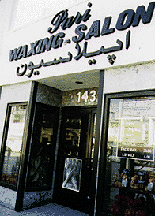

Iranian beauty salon in
Westwood, California
![]()
By Bahar Jaberi
Portland, Oregon
The last article I wrote regarding identity crisis raised some questions and I'm sure some eyebrows. There are some Iranians who despite having changed their name to something Anglo-Christian did not support my ideas, nor my true story.
"What?" they said incredulously, "Your brother must have some emotional problems." Some wrote saying that they sympathize with my brother and that they experienced the same type of feelings.
I guess each person comes from a different background and experiences differ. It is true that when a person is in the midst of a strong sub-culture, such as in Los Angeles, he/she doesn't feel lonely and singled out like me who lives in Portland, Oregon.
In Los Angeles, Iranians have their own radio stations, stores, discotheques and a strong community ties. How can a person be singled out there? And of course it's impossible for everyone to live in the same place.
Some of my American friends who read the article were amazed. They sympathetically shook their heads, and one said: "I can't imagine living in a totally different place now and having to get used to the language and the culture."
Some asked me to tell them how it was; but memories can sometimes be painful, so this is how I tell my story:
I was thirteen years old in 1980 when my mother and father decided to leave Iran. We promptly obtained visas and flew to Spain. We had to stay there for four months, because it was during the Hostage Crisis and Iranians were on the black list at the American embassy.
We kept getting jerked around by a very tight bureaucratic system. They told us to come back "next Tuesday," "no, next Thursday" every week for four months. Until finally with the help of my grandparents, who lived in the U.S. and a U.S. senator, we were able to get our American visas.
When I started school, things had a fresh new feel. In the first few days it didn't really occur to me that people were laughing behind my back and gesturing to each other about the "new Iranian girl, you know, the camel jockey."
So that was the most common question asked by the kids at the high school I attended, "so, what was it like taking those hostages?" and, "How fast can a camel run?" etc. I was too young and naive to give a clever response. But when my English teacher called me "Queen of Sheba" I decided I won't take it any more.
I dropped the English class and added another one, and I learned to defend myself verbally and physically if need be against the bullies who insisted on being obnoxious.
Years passed, I graduated from that high school, and I found many American friends. I had tried so hard to please my American compatriots that I learned to dislike Iranians. (Now many of you are probably saying, "She's over-analyzing.") It's true. I repeat: I started to dislike Iranians.
My American friends were even amazed at my attitude. I have a friend now who always says, "The one thing that has stuck out in my mind about you, Bahar, is the fact that you were down on your own culture, and I couldn't figure out why."
I had no explanation for why I was "down" on my culture. But now when I look back it's because I had hardened myself against all of the stressful situations I had to go through because I was not American.
I am years older now and a little wiser. I learned a lot from my experiences, some good, some bad. The feelings I had were personal. The only person I harmed with my attitude was myself.
Like my brother, as time passes I am learning once again what it means to be an Iranian. I never quite lost my identity, I just chose to forget about it for a little while.